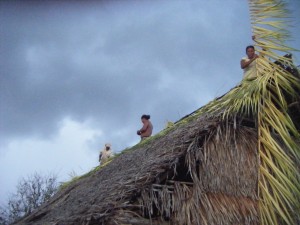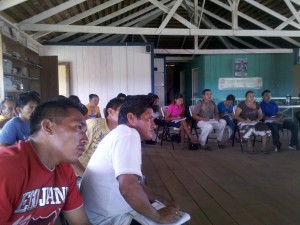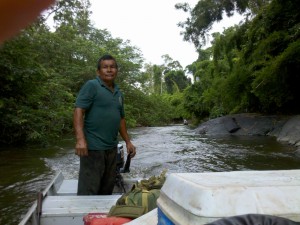Locally based monitoring in Guyana: keeping an eye on wellbeing with the Makushi Amerindians
By Ben Palmer Fry
Environmental management, and more specifically conservation work, has historically been led by natural scientists. As a result, despite the best intentions, the people who populate conservation areas are not always entirely content with the conservation projects taking place around them; these interventions, though environmentally beneficial, don’t always have a subtle understanding of local communities and so can’t effectively monitor the social impact. It is, however, essential that this social monitoring takes place, as the longevity of any project depends inherently on the support of local people.
 The policymakers who are compiling the REDD+ papers for the UNFCCC have an understanding of these linkages and so have included language that defines and preserves ‘social safeguards’, which simply means that the local people should never be disadvantaged by the implementation of a REDD+ project. As such, when developing monitoring systems in preparation for REDD+, social monitoring needs to be included alongside natural resource monitoring and forest carbon assessments. Examining ‘wellbeing’ is a nuanced way of conducting social monitoring, as it forces practitioners to look more deeply at the factors that influence and indicate the welfare of people.
The policymakers who are compiling the REDD+ papers for the UNFCCC have an understanding of these linkages and so have included language that defines and preserves ‘social safeguards’, which simply means that the local people should never be disadvantaged by the implementation of a REDD+ project. As such, when developing monitoring systems in preparation for REDD+, social monitoring needs to be included alongside natural resource monitoring and forest carbon assessments. Examining ‘wellbeing’ is a nuanced way of conducting social monitoring, as it forces practitioners to look more deeply at the factors that influence and indicate the welfare of people.
The Community MRV (measure, report and verify) project in Guyana, run by the Global Canopy Programme, has just finished the first workshop on monitoring wellbeing, and the CREWs (community resource and environmental workers) are out in their communities collecting information on the wellbeing of their people using ODK software on project smart phones.  The wellbeing questionnaires were designed over the course of the past year from community focus groups, locally-led wellbeing research, trial interviews and consultations with national and international stakeholders. They include factors such as community relationship, education, infrastructure, emotional wellbeing, health, assets and social problems. The data collected should thus be relevant for local management by the village councils, suitable for national REDD+ MRV by the Government of Guyana, and of interest to NGOs or agencies that are funding or working in this field. The wellbeing data also complements data from the other two ‘modules’ – Natural Resource Use and Forest Change.
The wellbeing questionnaires were designed over the course of the past year from community focus groups, locally-led wellbeing research, trial interviews and consultations with national and international stakeholders. They include factors such as community relationship, education, infrastructure, emotional wellbeing, health, assets and social problems. The data collected should thus be relevant for local management by the village councils, suitable for national REDD+ MRV by the Government of Guyana, and of interest to NGOs or agencies that are funding or working in this field. The wellbeing data also complements data from the other two ‘modules’ – Natural Resource Use and Forest Change.
 Early feedback is that the CREWs are finding the work very straightforward and the interviewees are enjoying the questions (interviews last about 20-30mins). The wellbeing monitoring is due to take place every 6 months.
Early feedback is that the CREWs are finding the work very straightforward and the interviewees are enjoying the questions (interviews last about 20-30mins). The wellbeing monitoring is due to take place every 6 months.
This work is forming the central part of Ben Palmer Fry’s PhD as he explores how CMRV may fulfil the requirements for monitoring under REDD+, and whether using the concept of wellbeing provides more balanced data from social monitoring.